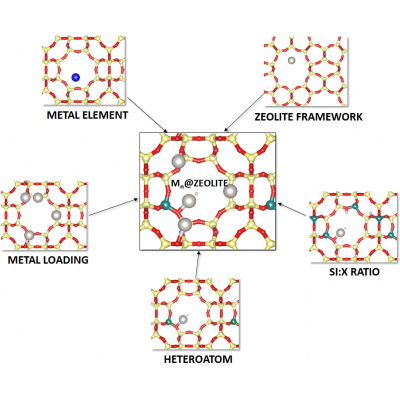Modelling of Zeolite-Encapsulated Catalytic Metal Clusters
Contact person and project supervisor: Dr. Christopher Heard, heardc@natur.cuni.cz
Websites: https://chrisheardresearch.wordpress.com/
http://physchem.cz/research/nanomaterials-modeling/
Research group: Nanomaterials Modeling
Leader of the research group: Doc. RNDr. Petr Nachtigall, PhD
Department: Physical and Macromolecular Chemistry
Project summary: Sub-nanometre sized metal particles represent the maximum possible atom-efficiency as catalysts for a wide range of industrially important reactions.[1] However, their implementation is currently hindered by a lack of stability of small particles against sintering and deactivation. A promising way around this problem is to encapsulate clusters inside an inorganic matrix, such as a zeolite. Recent experimental findings have suggested that this is both possible and tuneable by varying the experimental conditions (redox cycling, temperature, gas composition).[2] As this an emerging field, there is currently a large gap in basic understanding of how particles are arranged within microporous zeolite cavities, how they grow, migrate and decompose, and how the conditions affect the resulting catalyst. In this project we aim to shed light on this important multidimensional problem, and aid experimental chemists to design novel, stable, highly efficient catalysts for future technologies. We will achieve this through computational modelling of metal particle-zeolite interactions in the following way:
Use state-of-the-art computational methods[3] (density functional global optimization[4], ab-initio molecular dynamics[5]) to determine representative cluster structures/energetics in important zeolites.
Develop and test a microkinetic model to simulate and predict the kinetics of particle growth and migration under realistic conditions.
Collaborate closely with experts in zeolite synthesis and electron microscopy to explain the behaviour of real systems, and aid in design and optimization of next generation catalytic materials.

Schematic of the factors which influence stability and reactivity of encapsulated metal particles.
Features of a successful candidate: MSc. or equivalent in Chemistry, Physics or Materials Science, good knowledge of English (required), research background in molecular modelling, computational chemistry or solid-state physics (preferred). Experience with high performance computing and programming in a Linux environment (beneficial).
References:
[1] “Heterogeneous single-atom catalysis”, A. Wang, J. Li, and T. Zhang, (2018), Nature Reviews Chemistry, 2(6), 65–81.
[2a]“Stable platinum in a zeolite channel”, B. Weckhuysen, (2019), Nature Materials, 18, 778–779. [2b] “Evolution and stabilization of subnanometric metal species in confined space by in situ TEM”, L. Liu, D. N. Zakharov, R. Arenal, P. Concepcion, E. A. Stach, A. Corma. (2018), Nature Communications, 9 (1), 574.
[3a] “Towards operando computational modeling in heterogeneous catalysis”, L. Grajciar, C.J. Heard, A.A. Bondarenko, M.V. Polynski, J. Meeprasert, E.A. Pidko, P. Nachtigall, (2018), Chemical Society Reviews, 47 (22), 8307-8348. [3b] “2D oxide nanomaterials to address the energy transition and catalysis”, C.J. Heard, J. Čejka, M. Opanasenko, P. Nachtigall, G. Centi, S. Perathoner, (2018), Advanced Materials, 31 (3), 1801712. [3c] “Kinetic regimes in ethylene hydrogenation over transition-metal surfaces” C.J Heard, C. Hu, M. Skoglundh, D. Creaser, H. Grönbeck, (2016), ACS Catalysis, 6(5), 3277-3286.
[4] “Altering CO binding on gold cluster cations by Pd-doping”, H.A. Abdulhussein, P. Ferrari, J. Vanbuel, C.J. Heard, A. Fielicke, P Lievens, E. Janssens, R.L. Johnston, (2019), Nanoscale, 11,(34), 16130-16141.
[5] “Fast room temperature lability of aluminosilicate zeolites“, C.J Heard, L. Grajciar, C.M. Rice, S.M. Pugh, P. Nachtigall, S.E. Ashbrook, R.E. Morris, (2019), Nature Communications, 10 (1), 1-7.
Current research grant of the project leader: GACR grant 20-26767Y: “Stability of Metal Particles Encapsulated in Zeolites: Multiscale Modelling and Experimental Benchmarking” (two postdocs and two PhD students) 2020-2022. Total budget approx.€ 250.000.
Deadline is closed